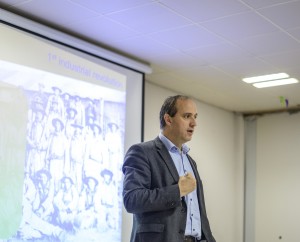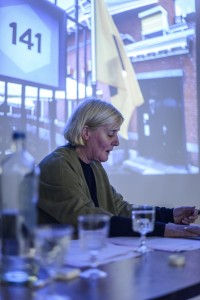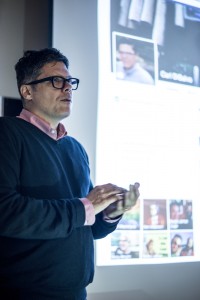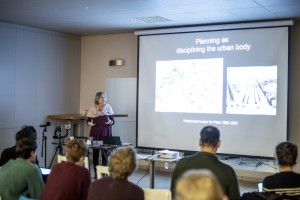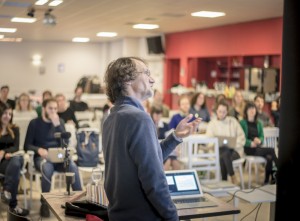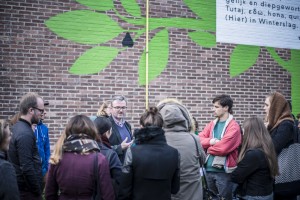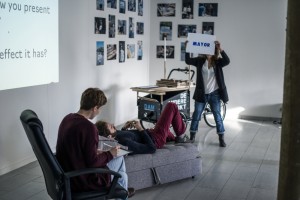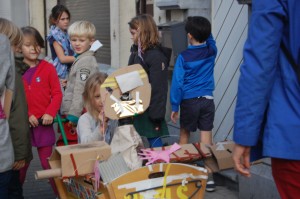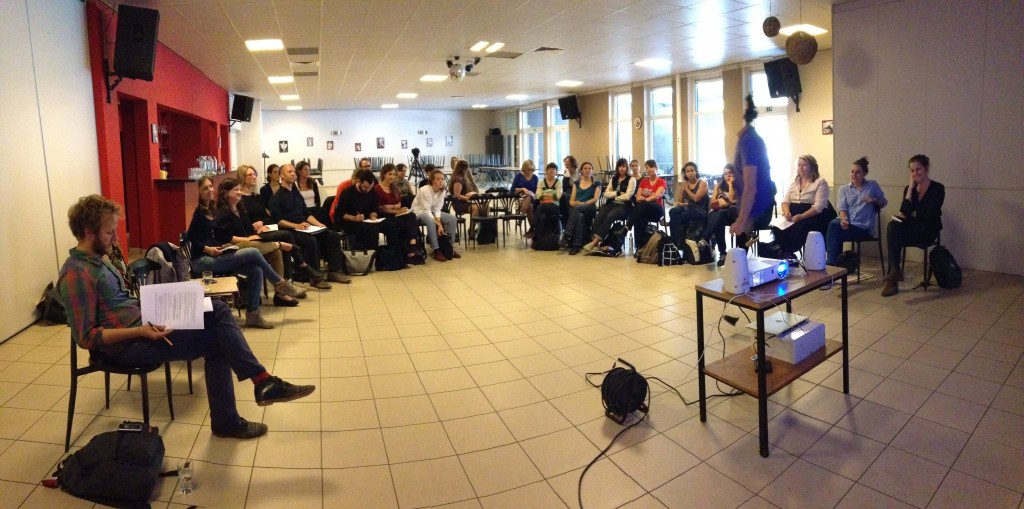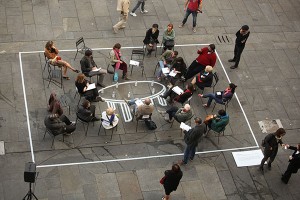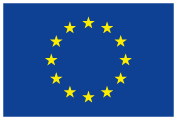2nd TRADERS International Autumn School
9-13th November 2015, Genk (BE)
From the 9th to the 13th of November of 2015, the second international Autumn School of TRADERS took place in Genk. Under the title “On the role of participatory art and design in the reconfiguration of work (in Genk)”, the program included a diverse series of lectures, working tables -guided by each TRADERS’ ESR-, local projects to contextualize the work and reflections, and non-work activities like an informal night tour around the garden-cities (cités). Tuesday and Wednesday most of the lectures took place, whilst two were programmed for Thursday (one of them cancelled due to the speaker’s illness); on Thursday afternoon and Friday morning-midday the group of participants divided into 5 groups and joined one of the working tables, organized by each of the TRADERS’ researchers. The results where presented on Friday at 15h, followed by a group reflection by Liesbeth Huybrechts and Carl DiSalvo.
Monday 9th of November
On Monday the 9th of November we hosted an informal welcome and drinks to the Autumn School in De Andere Markt, the shop-front working as a living lab by the host researcher of TRADERS. Veerle van der Sluys, as director of LUCA School of Arts (Campus C-Mine) gave a first welcome and impression of Genk; Pablo Calderon Salazar, the host ESR, briefly described the context of the Autumn School and its relation to Genk; and Jan Boelen who, besides being the creative director of Z33, was born and grew up in Genk, gave his personal recommendations for the work of the week, particularly to look for the frictions in the city.
Tuesday 10th of November
On Tuesday the 10th of November, the official program of the Autumn School started with an introduction by Jessica Schoffelen, co-coordinator of the project, who gave a brief background of how TRADERS came into being and it’s connection to Genk, the host research group (Social Spaces) and the local projects. Wim Dries, current mayor of Genk, gave the opening lecture of the AS, by recounting what he calls the three industrial revolutions of Genk (coal, manufacturing and creative industries), and by inviting us to look for ways of re-building Genk society from the bottom-up. In contrast with the politician, the Dutch artist Jeanne van Heeswijk followed with her lecture, which described a process of creation of a neighbourhood cooperative in a marginalized neighbourhood of Rotterdam (Afrikaanderwijk). Then, Pelle Ehn, one of the pioneers of Participatory Design in Scandinavia in the 70’s, gave a historical background of how the three living labs they created in Malmö came into being and how did they work. At last, sociologist Pascal Gielen described the challenges of creative work in current (repressive) times. On the evening the group of participants took walking tours around Winterslag 1 and 2 (two of the three garden cities of the neighborhood).
Wednesday 11th of November
On Wednesday the 11th of November the program started by a lecture by designer and design educator Carl DiSalvo, who was also present during all the week. Carl gave a framework for understanding social design today and its potential as –what he calls- a prefigurative practice. Then, Wim Embrechts, interior architect from Brussels, described the creation of a project to empower youngsters in a marginalized neighbourhood of Brussels by encouraging them to develop their own skills and interests. After, Hilde Heynen, one of TRADERS supervisors, brought a missing topic –until now- in the different TRADERS’ for a: gender. Hilde described how the modernist city –and its public spaces- have fostered some kind of gender discrimination; she also made reference to Hanna Arendt and her differentiation of labour, work and action. After Hilde’s lecture, we visited the two projects that would serve as context for our work in the coming days: Betty’s Garden and De Andere Markt. Then we returned for the last lecture of the day, given by other of the TRADERS supervisors, David Hamers. David shared his research in two types of environments: former mining region in Poland and suburban towns in the United States.
Thursday 12th of November
Frank Moulaert was the third TRADERS supervisor who gave a lecture during the Autumn School. He spoke about (the role of) social innovation in a post-political context. He did so by framing what he understood as SI, taking as reference –and contrast- Ezio Manzini and the SPINDUS manual, which he contributed to. He stressed the importance of understanding the socio-political context of such projects. In the late morning (11h), given the cancellation from the other lecturer (Rianne Makkink) due to illness, we started to work in the different working tables, led by each of the TRADERS ESR’s.
Working Tables
- Naomi Bueno de Mesquita – Mapping labor: participatory practices as mode of inquiry in reconfiguring work.
- Jon Geib & Michael Kaethler – Problematising post-Fordist instrumentalisation of Art and Design labour.
- Pablo Calderón Salazar – To Intervene or not to Intervene? That is (not) the question.
- Annelies Vaneycken – Desire Lines of Genk: exploring play as means to rethink mobility and work (in Genk).
- Saba Golchehr – Genk’s economical shift: from mining coal to mining data. Strengthening the social networks of local entrepreneurs for future economic resilience.
Friday 13th of November
Friday saw the last day of the Autumn School, with a continuation of the collective work within the working tables and a public presentation at 15.00 in De Andere Markt. After, at 17.00, a collective and open forum was made to reflect on the input and work from the week. The forum was moderated by Carl DiSalvo and Liesbeth Huybrechts.
Final Reflection (Liesbeth & Carl)
- Should we be expected to ‘do’ social innovation? What is our role as researchers?
- Grounded theory?
- Awareness of the ‘three pillars’ of social innovation? Include important issues (matters of concern) into our projects / processes. Politicize. Gender! How to integrate these issues? What is still missing? Diversity, race, multi-disciplinarity…?
- Frank’s lesson: “how do we engage with an existing structure?”.
- The first (serious) discussion within the design community about ‘work’ (Carl DiSalvo).
- Similar perspective as ‘Hilde’s’, but in the realm of art. Design is solving problems, while art is creating them.
- How to inform artistic / design practices through design / art. Artists might see designers as a threat.
- Is there a clash between design and design research? Reflect on practice.
- What are the ‘sites of doing research’? Has it shifted from the office / atelier to the public? How is the work you are doing opening new sites of design (practice and research)? How do we learn to act in contemporary logics? Iterative process of action-reflection.

